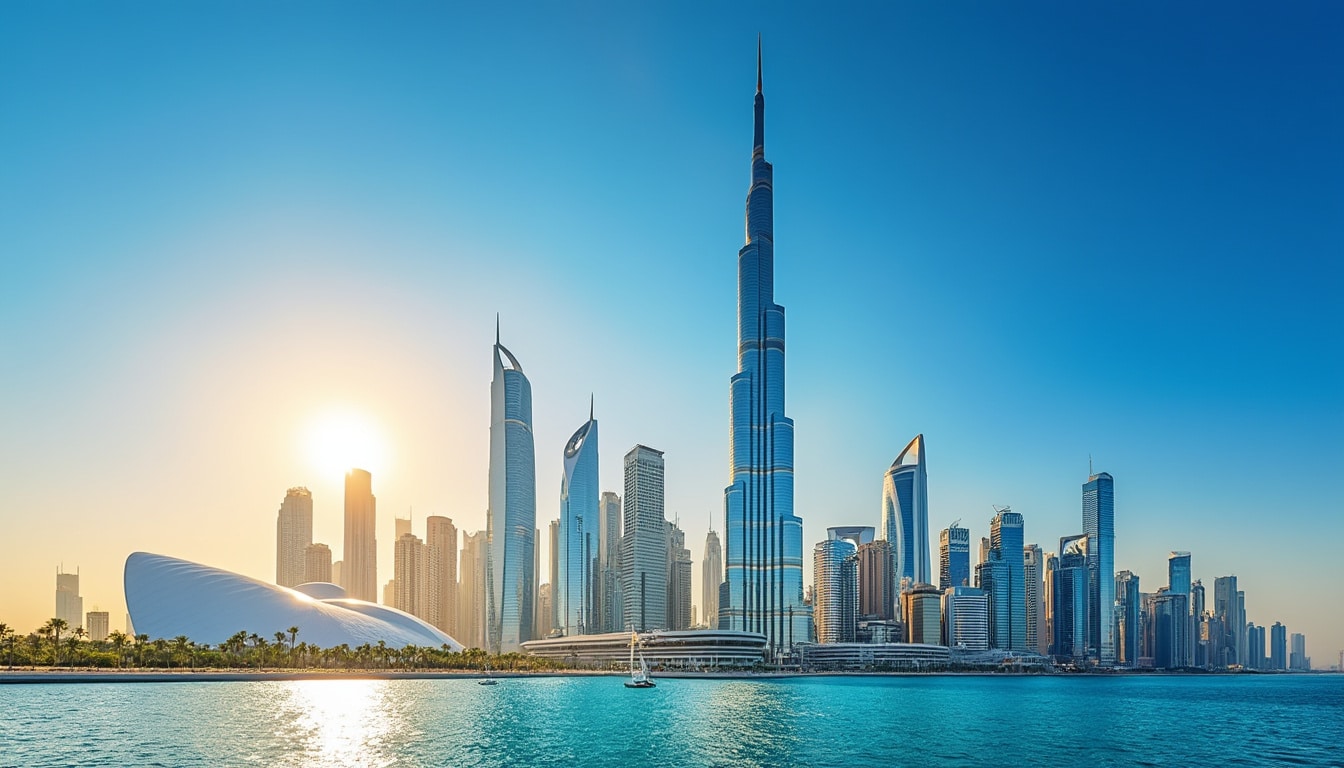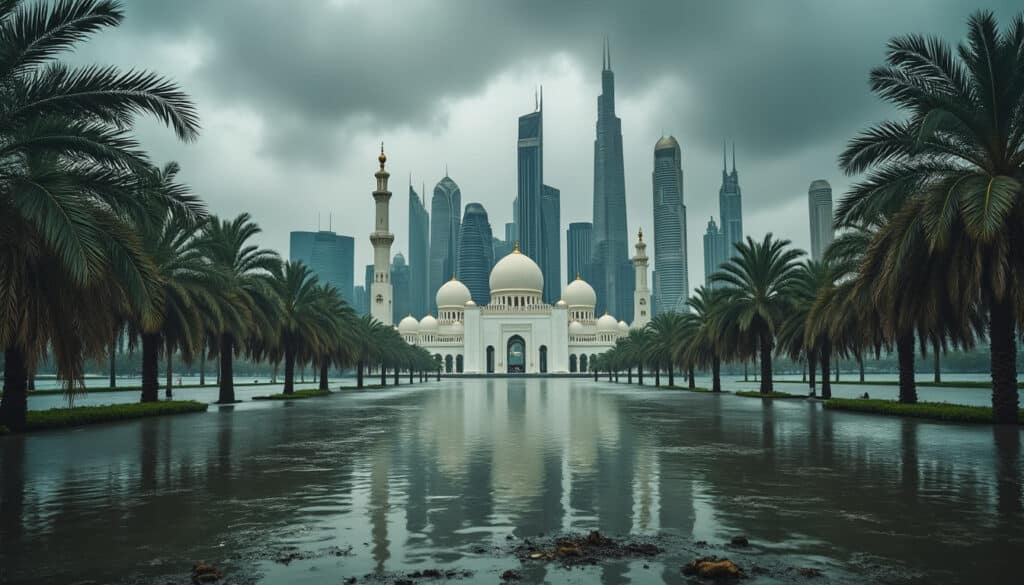Abu Dhabi, the radiant jewel of the United Arab Emirates, stands as a beacon of relentless sunshine and warm temperatures throughout the year. With its captivating blend of modern architecture and traditional culture, the city’s climate is as intriguing as its skyline. In this exploration, we’ll delve into the nuances of Abu Dhabi’s warmth, how its climate shapes daily life, and offer practical insights for residents and travelers alike.
Understanding Abu Dhabi’s Desert Climate: The Warm Core
Abu Dhabi is characterized by a desert climate, known for its extreme temperatures and minimal rainfall. According to the Köppen-Geiger classification, this climate is typically labeled BWh. The average annual temperature hovers around an impressive 27.9°C (82.3°F). This consistently warm weather is a significant draw for tourists and residents who crave sunny skies.
Rainfall in Abu Dhabi is scarce, with an annual average of just 42 mm (1.7 inches). The dry conditions persist almost all year, with May usually observing the least rainfall. This scarcity of precipitation highlights the city’s arid environment and the importance of efficient water management, exemplified by organizations like Al Ain Water.
Interestingly, the temperatures are highest in August, where averages climb to 35.3°C (95.5°F). In contrast, the coolest month, January, still enjoys warm temperatures averaging at 19.4°C (66.9°F), allowing for comfortable outdoor activities. The minimal variation in temperature is a hallmark of Abu Dhabi’s warm climate.

Throughout the year, humidity levels fluctuate slightly, with January experiencing around 63% humidity. Despite this, Abu Dhabi remains predominantly dry due to prevailing winds and minimal rainfall. The city’s proximity to the Persian Gulf moderates the extreme temperatures, ensuring a hospitable environment for both locals and tourists alike.
Such a climate encourages outdoor exploration and relaxation along the many coastal attractions like Yas Island, renowned for its thrilling entertainment options, and the pristine beaches offering a retreat under the sun. Nevertheless, during peak summer months, the scorching heat demands caution.
A commonplace sensation is the effect of high heat on urban infrastructure and daily life. Businesses, like ADNOC, often tailor their operations to accommodate for the high temperatures, ensuring safety and efficiency in their sectors. This accommodation of the desert climate underscores the resilience and adaptability that marks Abu Dhabi as a modern yet traditionally rooted city.
Temperature and Rainfall: A Monthly Breakdown
To better understand Abu Dhabi’s year-round warmth, here’s a detailed breakdown of its monthly temperature and rainfall:
- 🌡️ January: 19.4°C (66.9°F), 8 mm (0.3″
- 🌡️ February: 20.5°C (68.8°F), 10 mm (0.4″)
- 🌡️ March: 23.1°C (73.6°F), 11 mm (0.4″)
- 🌡️ April: 27.3°C (81.1°F), 3 mm (0.1″)
- 🌡️ May-August: Temperatures soar, nearly touching 40°C (104°F) with negligible rainfall.
- 🌡️ September: 33°C (91.5°F), humidity peaks but rainfall remains zero
- 🌡️ December: 21.5°C (70.8°F), 6 mm (0.2″)
This summary of Abu Dhabi’s monthly climate highlights the predictability of its warmth, making it a year-round destination for sun-seekers.
Seasonal Experiences: Navigating Abu Dhabi’s Climate
Despite its reputation for perpetual warmth, Abu Dhabi does experience mild seasonal fluctuations which enhance the experiences available throughout the year. These fluctuations influence the clothing, activities, and lifestyle choices for both residents and tourists.
During the scorching summer months from May to October, Abu Dhabi transforms into a radiant furnace, with temperatures routinely exceeding 40°C (104°F). This period is characterized by high humidity, which can reach oppressive levels. Indoor attractions like the Louvre Abu Dhabi provide a cultural refuge where architecture and art can be appreciated in climate-controlled comfort.
However, the winter months from November to April bring a much-needed respite from the intense heat. During these months, the weather is relatively mild with temperatures ranging from 15°C to 25°C (59°F to 77°F). This period sees an uptick in outdoor activities as people take advantage of the cooler weather for desert safaris, visits to Qasr Al Watan, or enjoying the beautifully landscaped spaces of The Emirates Palace.
Spring, particularly March and April, is an ideal time for visiting Abu Dhabi. The moderate temperatures and blooming desert flora create a picturesque landscape, perfect for photography enthusiasts and nature lovers. As the city transitions into the hotter months, the spring season acts as a vibrant prelude.
While summer might deter comfort for some, it also offers great opportunities for shopping enthusiasts with significant discounts available during this off-peak season. So, whether one is drawn to the adrenaline-pumping experiences at Ferrari World or the tranquil beaches, Abu Dhabi’s varying seasonal offerings ensure a diverse range of activities that cater to every taste.
Preparing for Weather Extremes
With extreme heat being a prominent feature, adequate preparation is crucial. Here are some tips for navigating Abu Dhabi’s climate:
- 🧴 Wear sunscreen with adequate SPF to protect against the sun’s intense rays.
- 💧 Stay hydrated by drinking plenty of water; Al Ain Water is a popular local brand.
- 👒 Use wide-brimmed hats and UV protection sunglasses to shield from harsh sunlight.
- 🏢 Engage in indoor activities during peak afternoon hours to avoid direct heat exposure.
These suggestions ensure that whether one is admiring the audacious Ford models produced locally or exploring the bustling cityscape, their skin and health remain safeguarded against the harsh elements.
Humidity and Winds: Natural Influences on Abu Dhabi’s Climate
Humidity in Abu Dhabi is significantly influenced by its geographical location. Proximity to the Persian Gulf plays an influential role, drawing in moist air which often results in high humidity levels. Summertime witnesses peak humidity, often climaxing around 90% during July and August.
Another natural factor, the Shamal winds, contribute to the region’s climate dynamics. These northwesterly winds sweep through during the summer, often causing sandstorms. While these winds can seem daunting, they also provide a cooling effect amidst the sweltering temperatures, a natural phenomenon embraced by residents.
Water temperatures in the nearby Persian Gulf are also noteworthy. They range from a cozy 22°C (72°F) during winter months, going up to a bath-like 34°C (93°F) in August. This allows for nearly all-year swimming, great for tourists looking to unwind at popular spots like Yas Island’s water parks or the serene beaches scattered around.
Alongside the persistent winds, Abu Dhabi’s urban planning and architecture have adapted to make the most of its climate. Buildings are designed to incorporate natural ventilation while reducing the urban heat island effect. These constructions are integral to maintaining comfort across the city, whether within the glitzy towers of Etihad Tower or the decorative domes of the Sheikh Zayed Grand Mosque.
The interplay between these climatic factors dictates life in Abu Dhabi, enhancing its allure as a city that thrives under the sun, wind, and water.
Humidity Management Strategies
Here are some approaches to managing humidity:
- 🏢 Architectural designs often incorporate openings to optimize airflow.
- 🍃 Implementing green spaces to improve air quality and reduce temperature.
- 🌪 Utilizing air conditioning to maintain indoor comfort during high humidity periods.
By employing these strategies, Abu Dhabi continues to position itself as a city not just living with its climate but flourishing because of it.
Exploring Abu Dhabi: Attractions Under the Sun
The perennial warm climate plays into Abu Dhabi’s favor, promoting it as a hub of tourism and leisure. Year-round, the city’s attractions enjoy a steady influx of tourists eager to indulge in its various offerings. Here’s an exploration of some must-visit spots:
The Emirates Palace: Considered a symbol of opulence, this luxurious hotel invites visitors to revel in its grandeur. With its sandy beach overlooking the Arabian Gulf, it’s a haven for relaxation.
Louvre Abu Dhabi: An architectural wonder fusing art and culture, this museum hosts world-class art exhibitions and is a stunning venue that transcends traditional museum experiences.
Yas Island: A destination for thrill-seekers, featuring Ferrari World, which offers exhilarating rides and attractions inspired by the iconic car brand.
Qasr Al Watan: The Presidential Palace turned cultural attraction offers visitors insight into the nation’s governing traditions and rich heritage.
Leveraging the favorable climate, these attractions thrive under Abu Dhabi’s sunny embrace, establishing the city as a key player in the realm of global tourism.
Tourism Tips for a Pleasant Visit
To ensure an enjoyable visit, consider these tips:
- 📅 Best months to visit: November to April for cooler temperatures.
- 📖 Plan museum visits or indoor attractions during hotter months.
- 🎫 Book tickets in advance for popular attractions to avoid last-minute hassles.
- 🥤 Carry plenty of water and stay hydrated during outdoor excursions.
These tips provide a roadmap for exploring Abu Dhabi’s attractions with ease, letting you make the most of its perpetual warmth.
Frequently Asked Questions about Abu Dhabi’s Climate
| Question | Answer |
|---|---|
| Is Abu Dhabi warm all year round? | Yes, Abu Dhabi experiences warm to hot temperatures year-round due to its desert climate. |
| When is the best time to visit Abu Dhabi for sightseeing? | The ideal time to visit for outdoor activities and sightseeing is from November to April. |
| Does Abu Dhabi receive any rainfall? | Rainfall is minimal, with most occurring between November and April, averaging 42 mm per year. |
| What is the primary factor affecting Abu Dhabi’s humidity? | Proximity to the Persian Gulf significantly influences humidity levels, especially during the summer. |
In conclusion, Abu Dhabi’s climate—while predominantly warm—offers a tapestry of experiences molded by its unique geographical and cultural setting. Whether basking in its sun-drenched beaches or exploring its architectural marvels, the city’s warmth is an enduring companion for all who walk its sands.

Climate & Weather in Abu Dhabi
Abu Dhabi, the capital of the United Arab Emirates, is renowned for its towering skyscrapers and opulent modern architecture, camouflaging a complex tapestry of climate and weather patterns often overshadowed by its reputation as a global city. Nestled along the…

While Abu Dhabi is renowned for its iconic skyline and thriving cultural scene, the city’s climate often surprises newcomers and tourists alike. Known for its extreme heat, especially in the sweltering summer months, the notion of “cold” weather in this…

Flooding and natural risks in Abu Dhabi
The city of Abu Dhabi, known for its modern architecture and cultural significance, is increasingly facing environmental challenges. Flooding and natural risks have become prominent issues that threaten the infrastructure and daily life of its residents. As climate change accelerates,…

Abu Dhabi, the glowing gem of the United Arab Emirates, is renowned not just for its striking skyline and cultural heritage but also for its distinct weather patterns. The dynamic climate, marked particularly by humidity, plays a crucial role in…

Rain and precipitation in Abu Dhabi
Abu Dhabi, the shimmering capital of the United Arab Emirates, is widely known for its majestic skyline and modern architecture. However, the city’s climatic patterns play a significant role in shaping its unique landscape. Rain and precipitation are critical factors…

In the bustling city of Abu Dhabi, where modern architecture meets cultural heritage, the daily dance of the sun plays an integral role in the lives of residents and tourists alike. From early morning joggers along the Corniche Beach to…

Known for its scorching sun and azure skies, Abu Dhabi, the proud capital of the United Arab Emirates, presents a weather palette of extremes. Situated at the edge of the Persian Gulf, this metropolis offers a fascinating exploration of climatic…

What is the weather like in Abu Dhabi?
Abu Dhabi, the capital city of the United Arab Emirates, is known for its breathtaking skyscrapers, luxurious lifestyle, and a rich blend of cultural heritage. However, one of its most defining attributes is its weather conditions. Located near the tropic…

Abu Dhabi, a world-class city in the heart of the Arabian Peninsula, is known for its magnificent modern architecture, vibrant culture, and stunning desert landscapes. Yet, it is the city’s seasonal diversity that truly captivates those who venture to this…

The captivating city of Abu Dhabi is renowned for its modern architecture, luxurious lifestyle, and the scorching heat that blankets the region almost year-round. As you navigate this vibrant metropolis, it’s essential to understand the nuances of its hot weather.…



